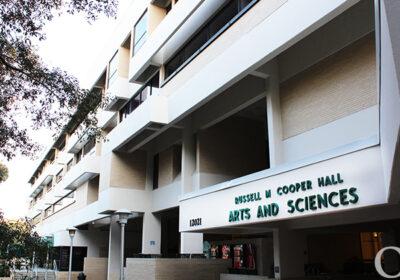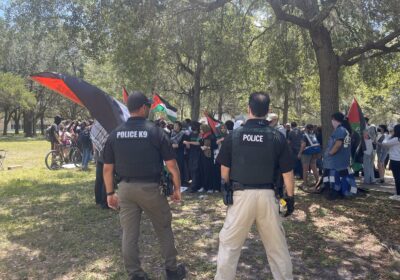SG aims to show students their rights

The Know Your Rights event, organized by Student Government Solicitor General Frank Cirillo, taught students about their rights both on and off campus. ORACLE PHOTO/MIKI SHINE
A small crowd of about 30 students came to the Know Your Rights panel Thursday evening, which focused on answering students’ questions about their legal rights, both on and off campus.
“I thought that in relation to recent events, it would be important,” Student Government Solicitor General Frank Cirillo said. “There’s a lot of stuff that’s going on in the news now, such as (police) body cameras, and there’s never really been an event like this on campus before. Students could really benefit from knowing about their rights.”
With political science professor Susan MacManus mediating, students heard from Lt. Charlotte Domingo of University Police, former Tampa Police Chief Jane Castor, lawyer Danny Alvarez and Tampa-area ombudsman Jennifer Schneider.
The panel tackled issues such as gun usage on campus, what to do when pulled over, how women in law enforcement are treated, international students’ rights and current mistrust of law enforcement.
One major topic that came up was carrying firearms on campus.
Alvarez made a point to say that despite being a lawyer, even he doesn’t remember the finer details of concealed carry laws. He instructed students to Google questions that they have about where it’s legal to carry.
He also argued if a student likes the right to carry a concealed weapon, they need to be responsible about it and remain informed of the law. Otherwise, they could cause serious issues for these who are responsible.
“Even someone who has a concealed carry permit cannot carry a concealed weapon on their person while on campus,” Castor said. “Florida law provides that someone can legally carry a firearm in their car. It needs to stay in the car. Once it comes out of the car, it’s a problem.”
When the conversation moved towards what to do when getting pulled over, Castor had a great deal to say. She said to follow the lawful word of the police and that it’s better to do what they say and complain later than to get caught up and cause a bigger incident.
Alvarez told the story of his little brother — a police officer being highly critical of the women in his training class. However, when they got out on in the field, he was caught up in a dangerous situation, and the woman he was most critical of in class came in as back-up and managed to deescalate the situation.
“Any time you have someone who can communicate with people easily, they’re likely to see more success at resolving a situation without it escalating,” Domingo said. “Being able to deescalate a situation is one of the critical skills a police officer learns, so I think it’s incumbent on all of us to learn how to communicate with each other.”
Part of the panel focused on the rights of international students while studying in the U.S. According to Domingo, international students have the same rights as non-international students, except those with diplomatic immunity.
“I think we don’t always know how to respond to the needs of international students as well as we want to,” Schneider said. “If you’re an international student, or know international students who have experienced issues specifically because they’re international, then the administration would like to know about those things.”
Toward the end of the discussion, MacManus allowed students in the audience to ask questions. One that came up was about the current negative view the public has of police officers after events such as in Ferguson, Missouri.
“One thing you may not be aware of is that public perception of law enforcement is very low,” Castor said. “If a doctor does something wrong and kills a patient, the public perception of the medical profession overall is still very high that person just shouldn’t be a doctor.
“If you look at public perception of law enforcement, it looks like an EKG chart. A police officer dies in the line of duty then everybody loves police officers. Something like Ferguson happens, and every police officer in the nation is a killer. There’s close to 800 thousand police officers across the nation. The problem is that the bad ones reflect poorly on all of us.”







